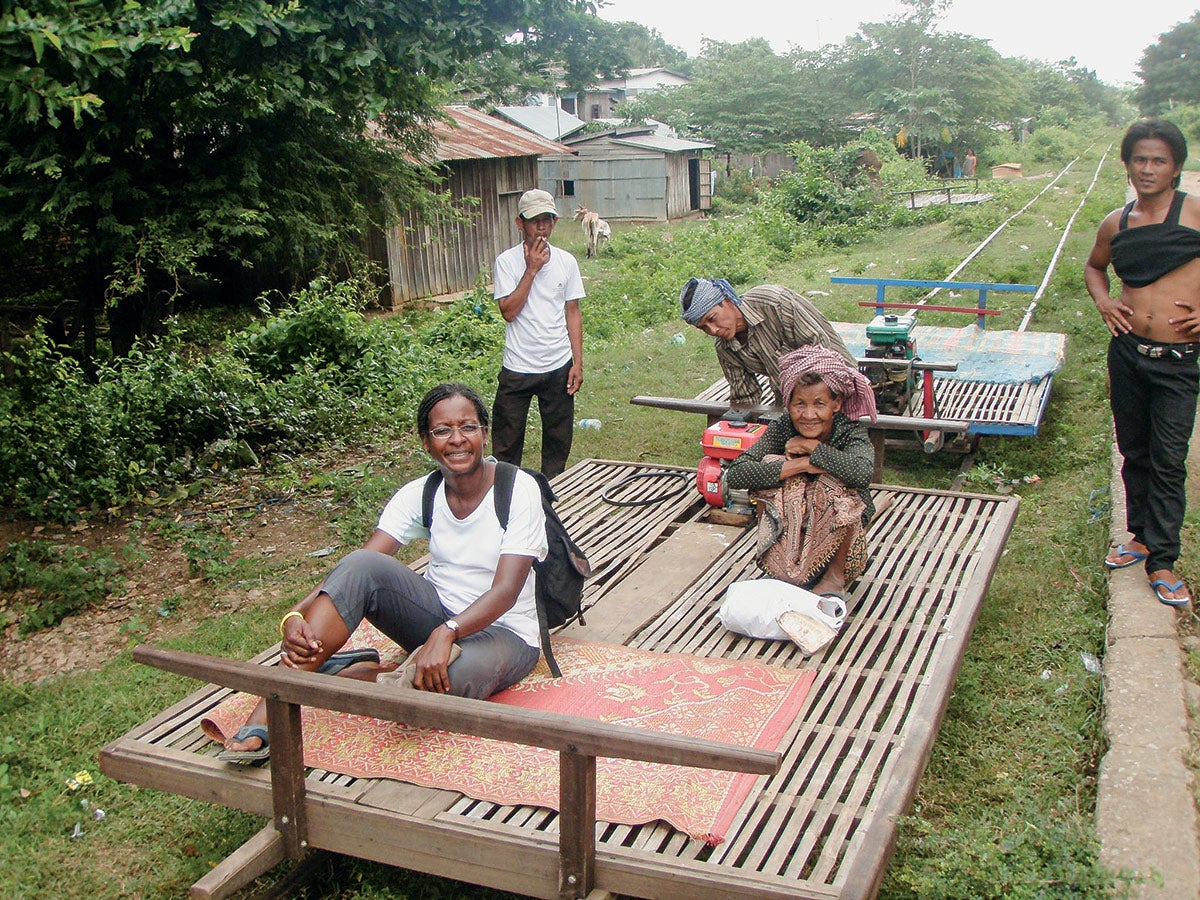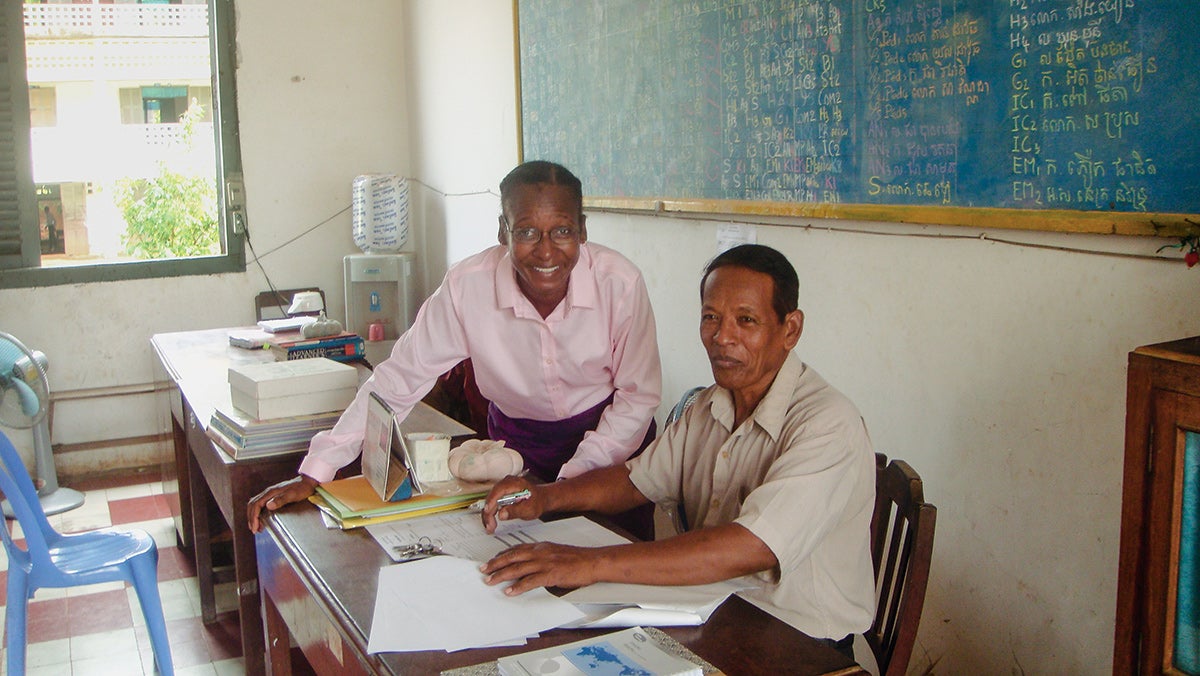features
An Urge to Serve
Alumna Darlene Grant Became a Peace Corps Volunteer at 49; 11 years later, she joined the agency’s top ranks.
.jpg) Photo: David ColwellDarlene Grant
Photo: David ColwellDarlene GrantIn seventh grade, with a bully on her heels, Darlene Grant slipped through a door at her Cleveland junior high school and found herself in the music room, staring at a line of students.
Wanting to avoid a beating, she got in line, “like I was supposed to be there,” she said, and the music teacher handed her the last instrument in the closet: a bassoon.
“That moment when you realize you’re where the universe needs you to be? That was one of them,” said Grant, PhD (SAS ’84).
Today, Grant is senior advisor to Peace Corps Director Carol Spahn, with a mission to cultivate diversity in the worldwide agency and help remove barriers for underrepresented volunteers and staff and create a more just and equitable organization.
But to get there, she had to travel from a challenging Cleveland childhood—and that bassoon started the journey.
It led a teenage Grant to Case Western Reserve, where she joined an on-campus program that supplemented her school’s music program. As she walked on university paths, Grant imagined a future college education. Years later, she traversed those same walkways as a graduate student at what’s now the Jack, Joseph and Morton Mandel School of Applied Social Sciences.
Grant then worked for decades, first as a social worker and later as a professor at the University of Texas at Austin, before she again found herself facing difficult challenges.
Inspired to “test my mettle,” she opened another door—to the Peace Corps.
What was supposed to be a mid-career sabbatical—a two-year stint teaching as a volunteer paid a small stipend—became her next chapter.
In a recent interview, Grant spoke with Think about helping to shape a more diverse Peace Corps and how “a challenging life situation can open the door to something beyond your wildest dreams.”
What was your childhood like?
I grew up on the East Side of Cleveland in a poor, predominantly Black area. Early on, I was told to shut up, that I didn’t have anything to say that people wanted to hear. I took that to heart. Thank goodness I crawled into books and not something else.
Why did you pursue a career in social work?
My family likes to say I was already a social worker by age 3. I was watching people [and] saying, ‘Hmm, gotta be a less painful way to live life.’
Years later, I failed my first semester of college [at Wittenberg University]. Teary-eyed after receiving the letter expelling me from university, [I talked with] three white women in a dorm room down the hall who coached me in navigating the academic probation process so I could remain and prove myself. That new cross-cultural interaction was akin to giving someone a fishing pole instead of the fish.
When I was readmitted, I decided I wanted to be able to do that for others.
How did your experience at CWRU confirm you were on the right path?
Ilga Svechs [now an associate professor emeritus] was larger-than-life in the social work program. She said, ‘You must listen with your third ear.’ I made a career of listening for what’s not being said. That opened up the world to me.
My experience at the Child Guidance Center of Greater Cleveland, where I did my second-year internship and got my first job as a psychotherapist, was also formative. As much as I loved my profession, I didn’t want to be called a social worker. Growing up, it was social workers who took children away. But the center is where I learned pride in the profession, working with skilled colleagues, caring for children and adolescents who had been sexually abused, and navigating the pain of that work. I owe so much to Case Western Reserve for all the experiences it offered me, from junior high on.
 Photo: Courtesy of Darlene GrantDarlene Grant on the Battambang Bamboo Train in Cambodia. She helped with an empowerment camp focused on health exercise and nutrition for youth in a squatter village that had grown up and around the Battambang station after it was abandoned.
Photo: Courtesy of Darlene GrantDarlene Grant on the Battambang Bamboo Train in Cambodia. She helped with an empowerment camp focused on health exercise and nutrition for youth in a squatter village that had grown up and around the Battambang station after it was abandoned.What inspired you to join the Peace Corps?
I lost six university colleagues and friends over two years and was contemplating my mortality and worth. I had enjoyed a wonderfully rich social work career. I had mentored a lot of students. I have a loving family, and I helped raise two children. This was a different kind of search—to find out what I was made of and if I could still be of service to others.
I remember watching a speech by then [presidential] candidate Barack Obama in 2008, where he mentioned the Peace Corps. Earlier that day, I had gone to a memorial service with colleagues and friends, and we talked about pursuing other interests and just living life better. At the end of [Obama’s] speech, I opened my laptop and started my application.
What about the mission resonated so deeply with you?
I saw Peace Corps in a way that Peace Corps didn’t yet see or describe itself to resonate with the Black community.
I am the granddaughter of ministers. I grew up in the 1960s in a Black community steeped in the civil rights movement. The philosophy was one of self-help, of leveraging our strengths and not waiting for a handout.
That was my take on what Peace Corps could and should be: a way to use my skills, curiosity and courage to work alongside people—not impose what I think the solution should be—and leave them with a feeling of being seen and valued. The Peace Corps wasn’t a new calling, it was an extension of what I was always compelled to do.
What was your first assignment in Cambodia like?
During my training, I lived with rice farmers in their 70s. They spoke no English; I had some French in high school. My biggest fear was learning a new language at 49. But after 11 weeks, I had enough of it to begin service.
For my permanent placement, I was sent to a school [to teach English] in Battambang Province, Cambodia.
Volunteers must commit—and recommit—to their service every day, sometimes six, seven times a day.
My interactions were largely successful because I kept trying. I used the language, paid attention to very gendered norms. I dressed how teachers [traditionally] dress; I wore longer skirts and didn’t bare my arms.
— Carol Spahn, director of Peace Corps
There were times, early on, when several of my [Cambodian] counterparts ran to avoid me. I was encouraged to co-teach with them, which at first meant sitting in on their classes to observe. I didn’t understand then, but I do now, that that felt judgmental.
Everyone at school and in my community was watching and assessing me, too, which hits viscerally. You’re far from home, eating new food, you’ve got intestinal challenges, it’s hot, you’re sweating—then someone’s [canceling] their class to avoid being judged by you.
You served as a country director in Mongolia and Kosovo. Talk about seeking a director post.
My country director in Cambodia suggested I apply. My knee-jerk response was nope, no way. The responsibility—for the volunteers, host country staff, government partners—looked overwhelming. But being a volunteer helped me see that I could walk into those spaces respectfully, humbly and powerfully.
I became a country director [in Mongolia] less than a year after closing my service as a volunteer. Only a handful of people have [made that transition so quickly], but as a mid-career professional, I had a strong, rich foundation to build on.
 Photo: Courtesy of Darlene GrantDarlene Grant, then a Peace Corps volunteer, with a school administrator at the Teacher Training Center in Battambang, Cambodia.
Photo: Courtesy of Darlene GrantDarlene Grant, then a Peace Corps volunteer, with a school administrator at the Teacher Training Center in Battambang, Cambodia.What does your work as senior advisor entail?
I was on temporary duty in Cambodia in 2020 and helped with the evacuation of volunteers [amid COVID-19]. I returned to the U.S. on June 4; five days later, I got a call from the [then] Peace Corps director.
This also followed George Floyd’s murder. The agency’s response, albeit sensitive, fell short of what folks [wanted] from leadership. I, too, was wholly unsettled; angry one minute, hopeful the next. The director asked me to lead a task force addressing diversity, equity and inclusion.
Building back from the evacuation and responding to the racial reckoning the U.S. was facing, the agency was poised for meaningful cultural and structural change. Listening intently and responding, partnering across domestic and international differences, withholding judgment and rapport building with staff and volunteers for a sustained solution orientation, summarizes my work then and now.
It’s my personal commitment to approach diversity, equity, and inclusion authentically and honestly, to avoid serving as window dressing. I am proud to be a part of real agencywide evolution.
What are some of your priorities?
We need to continue diversifying our staff and volunteer corps, including people from all under-resourced, underrepresented communities. Including more people like me who are mid-career and can take a leave of absence to reenergize themselves through service.
We evacuated 7,000 volunteers in March 2020 and, as of March [of this year], we have over 1,300 volunteers in 53 countries. How do we build back in a world where folks are recovering from a pandemic, face crippling debt and have other options? How do we stay relevant? Our mission and the work we’ve done to improve during two-plus years of no volunteers in the field, allows us to boldly answer these questions.
Someone asked me recently, ‘Peace Corps still around?’ I said, ‘Yes, we are—and here’s my card. Let’s talk.’
Peace Corps is, among other things, a doorway to better understanding the world, a pathway to graduate programs, the Foreign Service and international development.
This is not the same Peace Corps it was before; it’s one that I’m part of evolving. We’re relearning and moving ahead because our partners in these countries require it of us.
Why should someone, especially a mid-career professional, join the Peace Corps?
By our middle age, we think about nurturing things that positively benefit others and will last long after we are gone. Peace Corps allows us to live out these values, emerging from the experience with greater respect, understanding and empathy for other peoples’ assets and strengths. Partnering on their priorities makes us stronger and surer that we can impact the world through service.
Peace Corps is an opportunity to serve others and to test your mettle. People think they have grit. I challenge you to join the Peace Corps and figure out if you really do.





